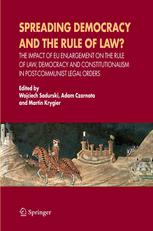

Most ebook files are in PDF format, so you can easily read them using various software such as Foxit Reader or directly on the Google Chrome browser.
Some ebook files are released by publishers in other formats such as .awz, .mobi, .epub, .fb2, etc. You may need to install specific software to read these formats on mobile/PC, such as Calibre.
Please read the tutorial at this link: https://ebookbell.com/faq
We offer FREE conversion to the popular formats you request; however, this may take some time. Therefore, right after payment, please email us, and we will try to provide the service as quickly as possible.
For some exceptional file formats or broken links (if any), please refrain from opening any disputes. Instead, email us first, and we will try to assist within a maximum of 6 hours.
EbookBell Team

5.0
108 reviewsThe accession of eight post-communist countries of Central and Eastern Europe (and also of Malta and Cyprus) to the European Union in 2004 has been heralded as perhaps the most important development in the history of European integration so far. While the impact of the enlargement on the constitutional structures and practices of the EU has already generated a rich scholarly literature, the influence of the accession on constitutionalism, democracy, human rights and the rule of law among the new member states has been largely ignored. This book fills this gap, and addresses the question of the consequences of the "external force" of European enlargement upon the understanding and practice of democracy and the rule of law and among both the main legal-political actors and the general public in the new member-states. A number of leading legal scholars, sociologists and political scientists, both from Central and Eastern Europe and from outside, address these issues in a systematic and critical way. Taken together, these essays help answer a fundamental question: does the European Union have the potential of promoting and consolidate democracy and human rights?